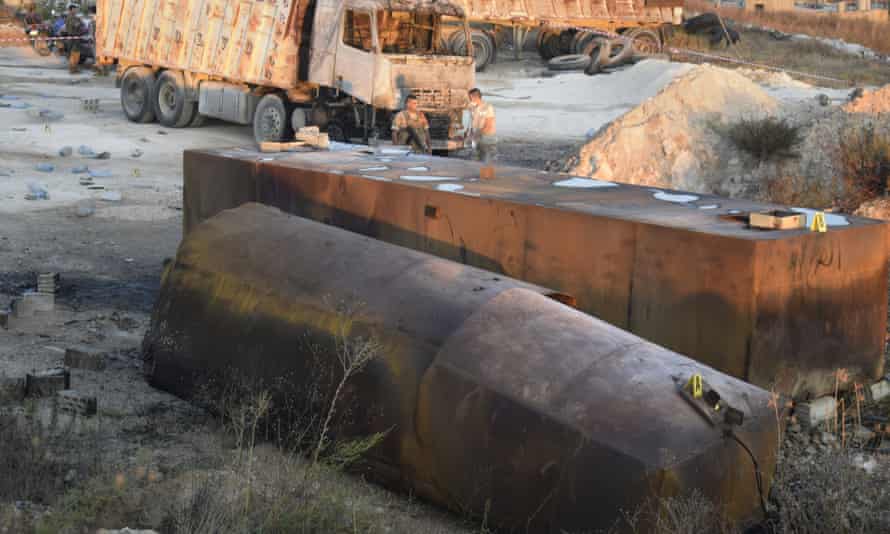
by asumetech.com — In Lebanon, fears of “time bombs” represented by petrol and diesel fuel stored in or near residential buildings are growing, days after the disaster of the explosion of a fuel tank in the village of Al-Talil in the Akkar region, which left more than 100 casualties including dead and wounded, the dead will be buried today. Lebanon has been suffering from severe fuel shortages for months, which has prompted many citizens to store gasoline or diesel in their homes or rooms and warehouses under their homes. in plastic containers e in unsafe conditions, while black market traders have been active on a higher level by stockpiling large quantities of these materials in various locations in all of Lebanon, and sometimes in populated areas, hoping to sell them at prices much higher than the official price for these subsidized materials.
After three days of intense raids, the army announced on Tuesday that it had seized more than 4 million liters of gasoline and 2.2 million liters of mazout and forced them to sell most of them on the market, after being discovered inside. of concrete, iron or plastic drums, showing the extent of the danger that threatens civilians. Atef Mansour, mayor of Burj al-Barajneh and al-Raml al-Aali, a suburb of Beirut, launched an appeal Tuesday on behalf of the population of the area, “to the security forces to speed up the emptying of the enormous quantities of fuel stored under the their homes … to avoid a repeat of the disaster of Tallil “in Akkar. “The neighborhood sleeps on the crater of a volcano, they saved it,” he added. The specialized journalist in environmental issues, Mustafa Raad, said: “Storing gasoline and diesel in homes is equivalent to hiding a time bomb among the homes of safe people, as these homes are not equipped against fire, and the rapid interaction of these materials with oxygen , which increases the rate of fire spread throughout the house and residential floors.
The Akkar explosion disaster occurred a few days after the first anniversary of the Beirut port explosion, which killed and injured more than 6,000 people, while authorities attributed it to the explosion of tons of nitrate. ammonium stored there for several years. I am still in investigations into the Akkar explosion, which took place during a gathering of dozens of citizens, after an army force had seized large quantities of hidden petrol. The Ministry of the Interior and the municipal authorities of various regions had put in guarded months ago about the dangers of fuel storage. In October 2020, Beirut Municipality announced that firefighters and a municipal guard force had raided in a warehouse in the busy Al-Fakhani neighborhood inarea of New Road, which contained about 180 gallons of diesel and about 17 gallons of gasoline.
The head of the Beirut Fire Department’s Public Relations Division, Lt. Ali Najm, said firefighters have been participating for months to support legally authorized security forces in raids to confiscate stored fuel that poses a threat to the safety of citizens, pointing to an existing mechanism that obliges the citizen to call a toll-free number for reporting.For violations that violate public safety regulations, provided that the caller’s name remains confidential. Najm said a circular issued by the Beirut Governorate Authority at the beginning of the fuel crisis in Lebanon puts in guard against the dangers of storing gasoline and diesel and calls for action to prevent the danger. Najm’s words mean that the security raid is not subject to a secret communication from a citizen as long as there is authorization from the governor of Beirut to move, especially since they have already occurred and were an early warning before the Akkar disaster.
On July 26, the Beirut municipality announced that a fire had broken out in an electric generator e in a diesel tank on the roof of a building that includes offices and apartments in thearea Beirut Corniche Mazraa. While a source in the Lebanese Army Orientation Directorate confirms that the army receives many phone calls to report dangerous fuel storage sites and expose their traffickers, few are willing to reveal their identity. A woman who works for one of the municipalities of a large Lebanese city wondered if anyone was really willing to reveal the names of monopolists or traffickers in her area, for fear of reprisals.



